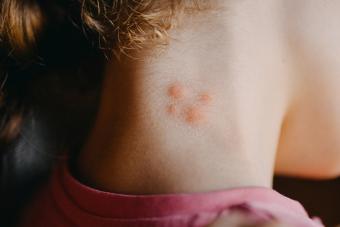
It's worth understanding how alcohol and caffeine cause dry skin. After all, both substances are commonly consumed day in and day out. It's important to recognize the toll they take on the skin over time.
Dehydration Shockers
The scene is all too familiar: You're wiped out after a long day at the office. Factor in a couple of hours in traffic and all you want to do is pour yourself a nice glass of wine when you finally walk through the door. Maybe you'll even dig into that box of chocolates you've been daydreaming about. In theory, it's the perfect end to a sluggish day. In reality, it's the rocky path to a lifetime of stressed, tired skin. Of course, the odd glass of alcohol won't hurt. However, dry skin sufferers do more harm than good when they indulge in that temporarily satisfying glass of bubbly.
Likewise, that delicious cup of caffeine-laden coffee might be a pick-me-up - but it's an instant put-down for your skin. Your favorite poolside drink might be a frothy, icy cappuccino, but those daily indulgences soon add up. Before long, your skin will pay the price.
It isn't only alcohol and caffeine that result in dehydration. Other factors, like fried foods, soft drinks, cigarettes and excess sugar, can also have a similar impact on the condition of the skin.
How Alcohol and Caffeine Cause Dry Skin: the Basics
Alcohol and caffeine are diuretics. An excess amount of either or both substances can result in dry skin because they cause individuals to urinate more often. This, in turn, results in a depletion of water.
It's easy to figure out how quickly positive habits are negated by poor ones. Consider the avid water drinker, who downs at least the recommended eight glasses per day (perhaps combining it with other hydrating beverages). In 1998, a survey sponsored by the International Bottled Water Association and the Nutrition Information Center found that Americans drink an average of five alcoholic or caffeinated beverages per day. Essentially, individuals who do this are canceling out the positive effects of drinking great quantities of hydrating fluids.
Of course, there are also those who simply dislike the taste of water. Many individuals instead opt for a convenient soft drink can, a sugary juice beverage or a cup of coffee. Though they all taste vastly different from each other, they share one common trait: skin-drying caffeine.
Sipping water doesn't have to be a chore. Bring the drink to life with a squirt of lemon or lime. Be adventurous and add cucumber, a hint of lemon and a couple of sprigs of mint for a more intense flavor. Of course, sip it chilled to really cool down after a long day.
Give Your Skin a Boost
If years of bad habits have started to take their toll on your skin, it's time to make a change. Now that you know how alcohol and caffeine cause dry skin, you can slowly begin to cut down or eliminate the foods and beverages that suck the moisture away. This is an especially important step to take if your skin is very dry. Individuals prone to eczema and psoriasis are also wise to avoid these substances, as both skin conditions naturally lend themselves to exceptional dryness.
Prepare to say goodbye to flakes, itchiness and the unpleasant feel of sandpaper-like skin. These tips will set you off on the road to smoothness:
- Avoid extremely hot showers. Bathing in lukewarm water might be difficult at first - especially if you're used to losing yourself in a steamy tub for lengthy periods of time - but with a little patience, it will soon become tolerable.
- Limit your time in the shower or bath. The skin is simply not meant to be exposed to water for long periods, evidenced by prune-like hands and itchy skin. Ten to fifteen minutes is optimal; longer periods contribute to the loss of the skin's natural oils, resulting in moisture loss.
- Use a mild, gentle soap formulated with non-drying ingredients. Glycerin, lard, shea butter, goat's milk and vitamin E are all ideal ingredients in moisturizing cleansers. Look for the addition of nourishing oils, such as sweet almond, olive, grapeseed, sesame, marigold and coconut.
- Gently pat the skin dry after showering or bathing. Be careful not to rub the skin vigorously; the key is to dab it until it is nearly dry. Slight dampness is fine - in fact, it is better than drying the skin completely.
- The dampness serves as a perfect foundation for the moisturizer you follow up with. Slather on a rich body lotion or cream while skin is still slightly moist. The moisturizer will seal the water into the skin. If your skin is extremely dry, moisturize as much as possible throughout the day.







